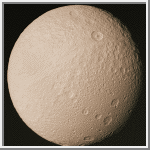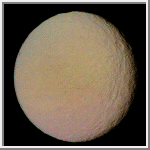 Tethys
Tethys
Saturn III
Tethys [TEE-this] was discovered by Giovanni Cassini in 1684. It is
an icy body similar in nature to Dione and
Rhea. The density of Tethys is 1.21
gm/cm3, indicating that it is composed almost entirely of
water-ice. Tethys's icy surface is heavily cratered and contains cracks
caused by faults in the ice. There is one
enormous trench on Tethys about 65 kilometers (40 miles) wide and
extending from above the center to the extreme left. It covers
three-fourths of Tethys' circumference. The
fissure is about the size scientists
would predict if Tethys were once fluid and its crust hardened before
the interior. The canyon has been named Ithaca
Chasma. A vast expanse of relative young
plains also exists on Tethys. Tethys' surface temperature is -187°
C (-305° F).
| Tethys Statistics
|
|---|
|
|
|---|
| Discovered by | Giovanni Domenico Cassini
|
|---|
| Date of discovery | 1684
|
|---|
|
|
|---|
| Mass (kg) | 7.55e+20
|
|---|
| Mass (Earth = 1) | 1.2634e-04
|
|---|
| Equatorial radius (km) | 530
|
|---|
| Equatorial radius (Earth = 1) | 8.3098e-02
|
|---|
| Mean density (gm/cm^3) | 1.21
|
|---|
|
|
|---|
| Mean distance from Saturn (km) | 294,660
|
|---|
| Rotational period (days) | 1.887802
|
|---|
| Orbital period (days) | 1.887802
|
|---|
| Mean orbital velocity (km/sec) | 11.36
|
|---|
|
|
|---|
| Orbital eccentricity | 0.0000
|
|---|
| Orbital inclination (degrees) | 1.09
|
|---|
|
|
|---|
| Escape velocity (km/sec) | 0.436
|
|---|
|
|
|---|
| Visual geometric albedo | 0.9
|
|---|
| Magnitude (Vo) | 10.2
|
|---|
| Mean surface temperature | -187°C
|
|---|
 Tethys
Tethys
This view of Tethys was taken by Voyager 2 on August 26, 1981.
It is the highest resolution image acquired by the Voyager
spacecraft. An enormous trench named Ithaca Chasma
extends from the left side of this image to the upper center.
(Credit: Calvin J. Hamilton)
 Tethys Color Composite
Tethys Color Composite
This view of Tethys is a color composite of three images
taken by Voyager 2 on August 25, 1981.
(Credit: Calvin J. Hamilton)

 Saturn
Saturn
 Enceladus
Enceladus
 Telesto & Calypso
Telesto & Calypso

Copyright © 1997 by Calvin J. Hamilton.
All rights reserved.
 Tethys
Tethys
 Tethys Color Composite
Tethys Color Composite

 Saturn
Saturn Enceladus
Enceladus Telesto & Calypso
Telesto & Calypso